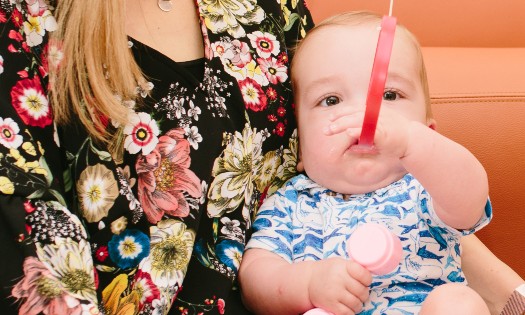The innovation: Adapting proven behavioral parent training to improve outcomes for children with congenital heart disease
Children with congenital heart disease (CHD) are at a higher risk of developing behavioral problems, such as inattention and hyperactivity. These behavioral problems negatively affect the parent-child relationship, which can interfere with successful treatment and impair patient outcomes.
Parent-child interaction therapy (PCIT) is an evidence-based behavioral parent training program that equips caregivers with tools to effectively manage — and even prevent — behavioral problems in young children. Through therapist-guided coaching sessions, caregivers learn skills to improve interactions with their children. By focusing on child-centered interaction and behavior management skills, PCIT can help foster constructive child behaviors and relieve caregiver stress.
Pediatric psychologists within the Heart Center at Children’s Health℠ are leading the way in adapting PCIT for CHD patients and their families. Beginning in summer 2023, the Children’s Health Cardiac Neurodevelopmental Program will be the first Heart Center program in the country to offer PCIT to this patient population.
This initiative is the latest advancement to support the Heart Center’s broader mission to provide comprehensive, accessible neurodevelopmental care throughout the continuum of care. “We know that better parent-child relationships lead to better outcomes,” says Randi Cheatham-Johnson, Ph.D., Licensed Psychologist in the Children’s Health Heart Center and Assistant Professor at UT Southwestern. “Offering PCIT as part of our cardiac neurodevelopmental program advances our goal of providing our patients and families with the therapies they need, as early as possible, to help optimize their development.”
The big picture: Parent-child interaction therapy helps address behavior problems while relieving caregiver stress
Increased risk of behavioral problems is associated with CHD. Congenital and acquired heart disease, as well as cardiac surgery and hospitalization, can affect brain development and lead to behavioral issues. Further, medical providers often educate caregivers to carefully monitor their children for symptoms of cardiac distress as they undergo and recover from heart surgery and other CHD treatments. Over time, a hypersensitive approach can contribute to permissive parenting, in which caregivers are loving and responsive but tend to provide fewer rules or consequences.
To address behavior problems, PCIT features real-time coaching sessions for caregivers as they interact with their children. In these sessions, the caregiver and child are together in a playroom while the therapist watches through a one-way mirror in an observation room. The caregiver wears a "bug-in-the-ear" device so the therapist can provide in-the-moment coaching on skills and techniques to strengthen the parent-child relationship.
There are two phases of PCIT:
During the first phase (child-directed interaction), children are encouraged to lead the play activity while their caregivers follow along, implementing skills commonly used by play therapists to engage children. This phase aims to enhance the parent-child relationship by maximizing positive communication, attention and imitation during child-led play. This phase also helps children feel calm and secure in their relationships with their caregivers, and caregivers learn to improve their children’s behavior with only positive attention.
In the second phase (parent-directed interaction), therapists coach caregivers on proven techniques such as planned ignoring, effective commands, consistent consequences and structured timeouts. This phase provides live instruction and feedback on strategies to help a child accept their caregiver’s limits, comply with directions, respect rules and demonstrate appropriate behavior in public. It teaches caregivers to be consistent and predictable in managing their child’s behavior.
Through both phases of PCIT, caregivers learn to manage challenging behaviors while remaining confident, calm and consistent.
Children’s Health is providing phase one sessions at the Heart Center to help caregivers master the necessary skills before moving on to phase two. Phase two sessions will take place via telehealth so families will be at home when implementing techniques such as timeouts.
Key details: Implementing PCIT at Children’s Health Heart Center
Identifying candidates early
The psychology team is working with other Children’s Health Heart Center providers to develop a screening process that will identify families that could benefit from PCIT.
National expert panels consider PCIT to be a gold standard treatment for children ages 2 through 7 who have any of the following challenges:
Frequent temper tantrums
Defiance (refusing to follow directions)
Verbal and/or physical aggression
Destruction of toys and/or family belongings
Backtalk to adults
Whining or crying for no apparent reason
Constant attention-seeking
Hyperactivity
Interruption of others
Short attention span
Difficulty with behaviors at school, preschool and/or daycare
Measuring progress
Once families choose to participate in PCIT, the team will observe each caregiver with their child for a baseline assessment of parenting skills. The team measures progress throughout the PCIT course with several tools, including the Eyberg Child Behavior Inventory (ECBI), in which caregivers rate their children’s behavior each week to assess improvements and identify plateaus.
The team reassesses caregivers at the end of each phase to ensure they have mastered the necessary skills before moving on in the course. Families can continue to access a wide range of inpatient and outpatient neurodevelopment care as needed throughout the duration of their children’s heart care at Children’s Health. Therapies and services include specialized treatment for developmental delays in learning, language, social and many other skills and abilities.
Comprehensive neurodevelopmental care for cardiac patients in utero through young adulthood
Caregivers are more likely to raise concerns about behavioral problems to providers if they have been counseled about the possibility of neurodevelopmental issues from the beginning of their children’s cardiac care. That’s why the Children’s Health Heart Center is working to provide comprehensive, accessible neurodevelopmental care as early as possible, even before birth.
“We begin providing neurodevelopmental counseling to families from the time they receive a diagnosis at our fetal heart clinics to determine the services that may benefit them,” Dr. Cheatham-Johnson says. “We educate them about the neurodevelopmental risks, and we emphasize the importance of developmental monitoring through routine assessments. That way, we can better understand their children's developmental needs and connect them with early intervention services.”
For more information about PCIT and the Cardiac Neurodevelopmental Program at Children’s Health, stop by our booth at the World Congress of Pediatric Cardiology and Cardiac Surgery. Dr. Cheatham-Johnson and Corinne Anton, Ph.D., ABPP, Director of the Cardiac Neurodevelopmental Program and Assistant Professor at UT Southwestern, will be attending, and Dr. Anton will be presenting at the event.
Research also shows that patients are much more likely to adhere to recommendations and follow-up appointments when they’re able to access all their services at the same center. This adherence results in better overall long-term outcomes for physical and mental health. In the cardiac neurodevelopmental program, the psychologists offer inpatient and outpatient mental health support for patients and families from before birth through young adulthood. “We want to remain a consistent presence throughout our patients’ journey through the transition to adult care,” says Dr. Cheatham-Johnson
Learn more about the innovative Cardiac Neurodevelopmental Program at Children’s Health >>
Learn more about PCIT by listening to this episode of our Pediatric Insights podcast.


